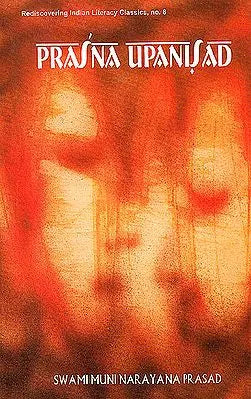Prasna Upanisad (Sanskrit Text, Transliteration, Translation and Detailed Commentary)
Prasna Upanisad (Sanskrit Text, Transliteration, Translation and Detailed Commentary)
PAPERBACK
Couldn't load pickup availability
| AUTHOR: | SWAMI MUNI NARAYANA PRASAD |
| PUBLISHER: | D. K. PRINTWORLD PVT. LTD. |
| LANGUAGE: | SANSKRIT TEXT, TRANSLITERATION, TRANSLATION AND DETAILED COMMENTARY |
| EDITION: | 2012 |
| ISBN: | 9788124601297 |
| PAGES: | 208 |
| COVER: | PAPERBACK |
| OTHER DETAILS | 8.5 INCH X 5.5 INCH |
| WEIGHT | 273 GM |
In Upanishads is articulated not only the quintessence of spiritual wisdom, but also the remarkable philosophical genius of the classical Hindu mind. Owing, however, to their complexity, metaphor, and even obscurity, Upanishad writings have been endlessly debated, discussed and written upon, more specially since Sankara's time. Swami Narayana Prasad's commentary is yet another valuable addition to the existing literature attempting, as it does, to rationally unlock the metaphysical subtleties of Prasna upanisad - with the master-key handed down to him in the disciples succession of Sri Narayana Guru.
Prasna Upanisad offers an enlightened exposition of brahmaoidua: knowledge of the Absolute/Supreme Reality. In an aptly thought-out dialectical situation, it offers a threadbare discussion of six questions which, centering around procreation/ origin of beings, prana: the most vital life-sustaining principle, functional states of the Self (puru$a), significance of meditating on AUM - lead to the finality of Vedantic wisdom: the sublimity of non-dual Reality: the param purusa of sixteen kalas.
With the English version of the Upanisad, Swami Prasad's interpretation highlights the true import of this metaphysical piece - spelling out its contexts in the light of what the author calls "the metalogic of yogic-buddhi" and all else that is allegorical, obscure and riddle-like. For the authenticity of this commentary, the author has had extensive discussions with a group of Vedantic scholars.
Share


